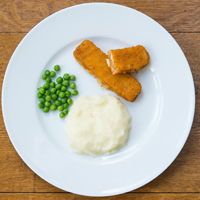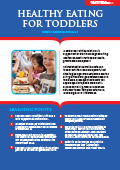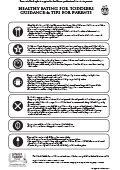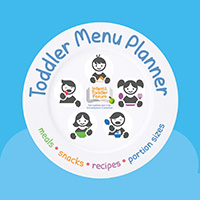
Use our Toddler Meal planning tool to ensure your 1-4 years old receives a balanced diet every day.
Find out more >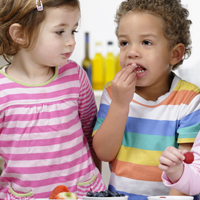
Use our toddler food tracker to check that your 1-4 year olds are getting a good balance of foods and activity
Find out more >
This educational programme for frontline professionals contains a range of practical resources on infant feeding.
Find out more >Guidance & Tips for Parents

A healthy diet for a toddler is different to that for an older child or an adult because toddlers need a more nutrient rich diet as they are growing rapidly
- Use some butter, margarine and oils in cooking.
- Give a mixture of white and some wholemeal/wholegrain breads and cereals because just wholegrain foods are too filling for toddlers.
- Limit cake, puddings and biscuits to one small serving per day and serve alongside fruit.
Toddlers will get adequate amounts of all the nutrients and energy they need if their diet is based on combining foods from the five food groups, along with a daily vitamin D supplement
- The nutrients in a healthy, balanced diet are protein, fat, carbohydrate, vitamins, minerals, omega 3 and 6 fats, and other protective plant compounds, fibre and fluid.
Toddlers will eat best when they have a routine of three meals and two to three planned snacks per day organised around their sleeping pattern
- Eat with your toddlers and praise them when they eat well, as this will encourage them to enjoy their meals.
Give your toddler between six and eight drinks per day to ensure adequate hydration that is, a drink with each meal and snack
- More may be needed in very hot weather or if they are particularly active.
- Use beakers and cups instead of bottles.
- The best drinks to give between meals and snacks are water or milk.
- Dilute drinks containing sweeteners with a lot of water.
- Do not give sugary drinks including fruit juices and smoothies to toddlers.
- Tea, coffee or fizzy drinks are also unsuitable for toddlers.
Foods that may cause harm
- Keep very salty foods to a minimum. This includes crisps and other salty snacks.
- Limit any sugary food and drinks to a maximum of four times per day to avoid the risk of dental decay i.e. limit them to three meals and no more than one snack per day.
- Do not give raw eggs or raw shellfish to toddlers as they may cause food poisoning. Make sure eggs are well cooked right through.
- Do not give shark, swordfish and marlin to toddlers, as they may contain high levels of mercury. Limit smaller oily fish to twice a week for girls and four times a week for boys. e.g. sardines, mackerel, salmon, trout, eel.
Do not give whole nuts to toddlers because of the risk of choking
- Ground or chopped nuts or nut butters are suitable. Soft round foods such as grapes and cherry tomatoes should be cut in half.
Give toddlers a vitamin A & D supplement each day
- This is for normal growth and development and to prevent rickets.
- It is especially important for fussy eaters, toddlers of African, African-Caribbean and South Asian origin and those living in the northern areas of the UK.
- Vitamin drops usually include vitamin C which helps with iron absorption.


